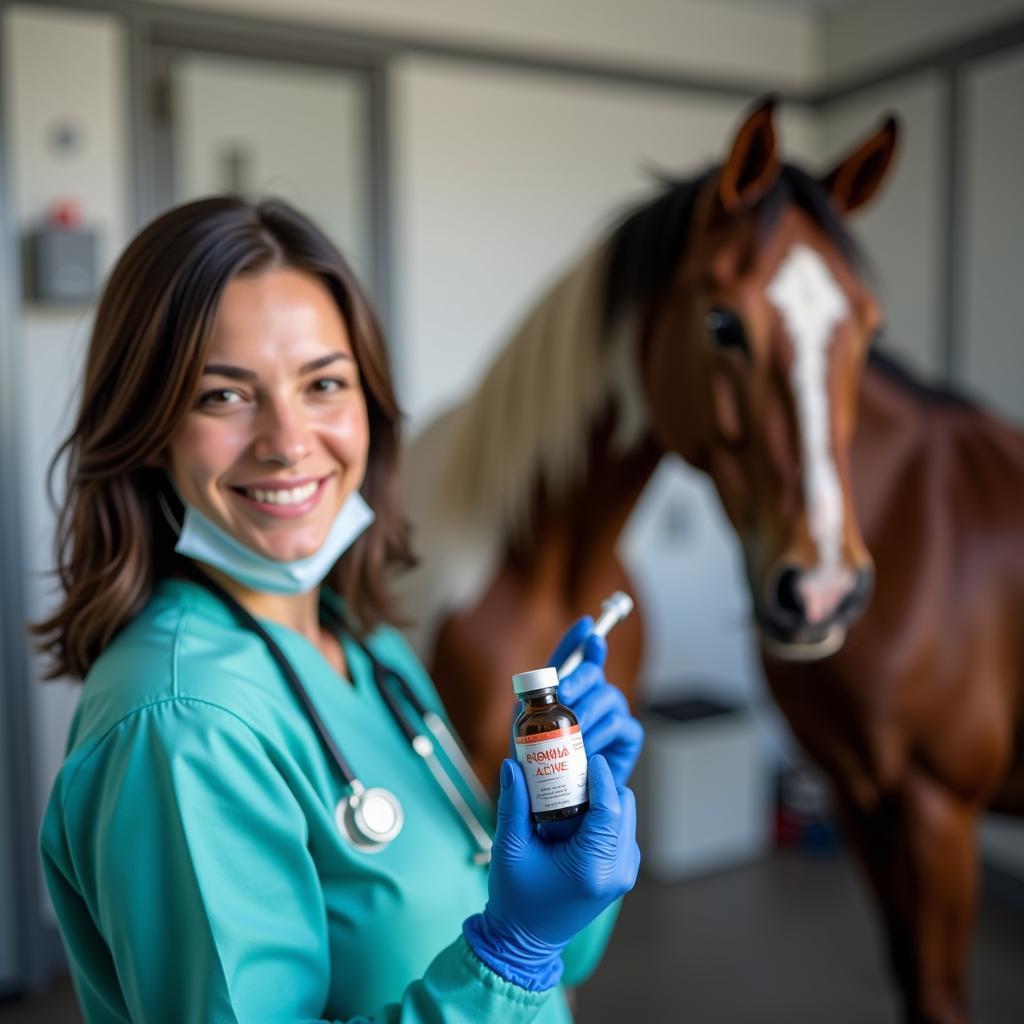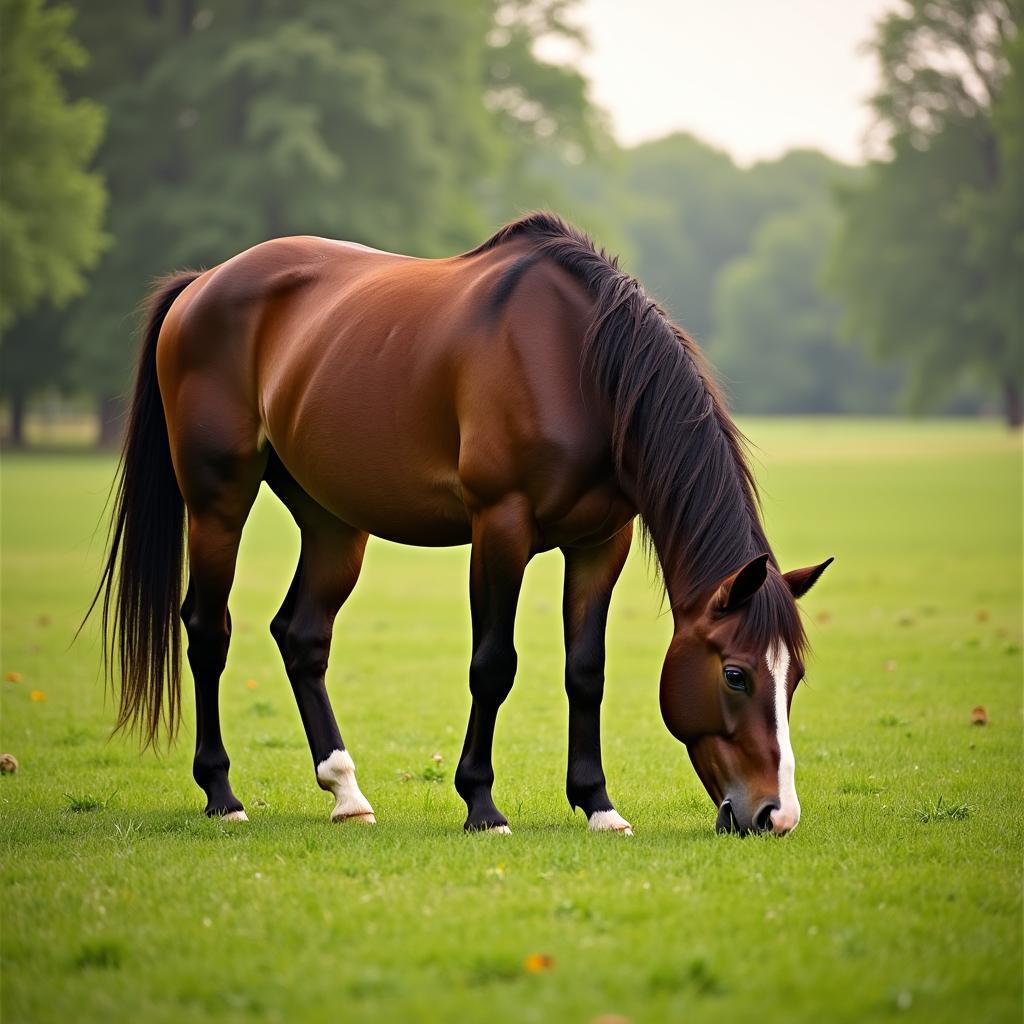The 7-way vaccine for horses, also known as the 7-in-1 vaccine or equine encephalomyelitis vaccine, is a crucial part of horse ownership. It protects your equine companion against a variety of potentially deadly diseases. But navigating the world of horse vaccines can be overwhelming. That’s why this guide provides a comprehensive overview of the 7-way vaccine, its benefits, risks, and everything else you need to know to make informed decisions about your horse’s health.
 Veterinarian Preparing 7-Way Horse Vaccine
Veterinarian Preparing 7-Way Horse Vaccine
Understanding the 7-Way Vaccine: What Diseases Does It Cover?
The 7-way vaccine is a combination vaccine that protects horses from seven different diseases:
- Tetanus: Caused by a bacteria found in soil and manure, tetanus leads to painful muscle stiffness and can be fatal.
- Eastern Equine Encephalomyelitis (EEE): A mosquito-borne virus that causes severe neurological problems and has a high mortality rate.
- Western Equine Encephalomyelitis (WEE): Another mosquito-borne virus that affects the central nervous system, WEE can be fatal, especially in young horses.
- Venezuelan Equine Encephalomyelitis (VEE): Though less common in the United States, VEE is a serious mosquito-borne virus that can cause flu-like symptoms in horses and potentially lead to encephalitis.
- West Nile Virus (WNV): This mosquito-borne virus can cause severe neurological disease in horses and is a significant concern for horse owners.
- Equine Influenza (Flu): A highly contagious respiratory disease that causes fever, cough, and nasal discharge, equine influenza can impact a horse’s performance and overall health.
- Equine Rhinopneumonitis (EHV): Caused by the equine herpesvirus, EHV can manifest as a respiratory illness, but certain strains can also lead to neurological problems or abortion in pregnant mares.
Why Is the 7-Way Vaccine So Important?
These diseases pose serious threats to your horse’s well-being, and in many cases, can be fatal. Vaccinating your horse with the 7-way vaccine is the most effective way to:
- Prevent Disease: The vaccine helps your horse’s immune system develop antibodies to fight off these diseases, preventing them from taking hold and causing illness.
- Reduce Disease Severity: Even if a vaccinated horse does contract one of these diseases, they are likely to experience milder symptoms and recover more quickly.
- Protect the Horse Community: Widespread vaccination helps create herd immunity, protecting vulnerable horses who cannot be vaccinated due to age or health conditions.
 Healthy Horse Grazing in a Pasture
Healthy Horse Grazing in a Pasture
When and How Often Should My Horse Get the 7-Way Vaccine?
Typically, foals receive their first 7-way vaccine around 5-6 months of age, followed by a booster shot 4-6 weeks later. After that, adult horses should receive annual booster shots.
“Maintaining a regular vaccination schedule is essential for ensuring optimal protection for your horse,” says Dr. Emily Carter, DVM, an equine veterinarian with over 20 years of experience. “Don’t hesitate to reach out to your vet if you have any questions or need guidance on your horse’s vaccination needs.”
5-way horse vaccine with west nile
Are There Any Risks or Side Effects?
The 7-way vaccine is generally considered safe for horses. Like any vaccine, mild side effects may occur, such as:
- Swelling or soreness at the injection site
- Mild fever
- Loss of appetite
- Lethargy
These side effects usually resolve on their own within a few days. In rare cases, more serious allergic reactions can occur.
If you notice any unusual symptoms after vaccination, contact your veterinarian immediately.
Making Informed Decisions About Your Horse’s Health
The 7-way vaccine is a vital aspect of responsible horse ownership, providing crucial protection against potentially deadly diseases. By staying informed about the vaccine, its benefits, and potential risks, you can make the best decisions for your horse’s long-term health and well-being.
Frequently Asked Questions about the 7-Way Vaccine for Horses:
1. What if I miss a booster shot for my horse?
Consult your vet. They might recommend a booster shot or a restart of the vaccination series.
2. Can the 7-way vaccine be given at the same time as other vaccines?
Your vet can advise on the best vaccination schedule for your horse.
3. What factors might influence my horse’s vaccination needs?
Age, health, exposure risk, and geographic location all play a role. Discuss these with your vet.
what is in the 5 way vaccine for horses
4. Are there alternative vaccines to the 7-way vaccine?
Yes, depending on your horse’s risk factors, your vet might recommend different combinations.
5. Where can I find more information about equine vaccinations?
Reputable sources include your veterinarian and organizations like the American Association of Equine Practitioners (AAEP).
Remember, this article provides general information and shouldn’t replace professional veterinary advice. Always consult your vet for personalized guidance on your horse’s health and vaccination needs.
Need help with your horse’s health? Contact us at Phone Number: 0772127271, Email: [email protected] or visit us at Address: QGM2+WX2, Vị Trung, Vị Thuỷ, Hậu Giang, Việt Nam. Our dedicated team is available 24/7 to assist you.